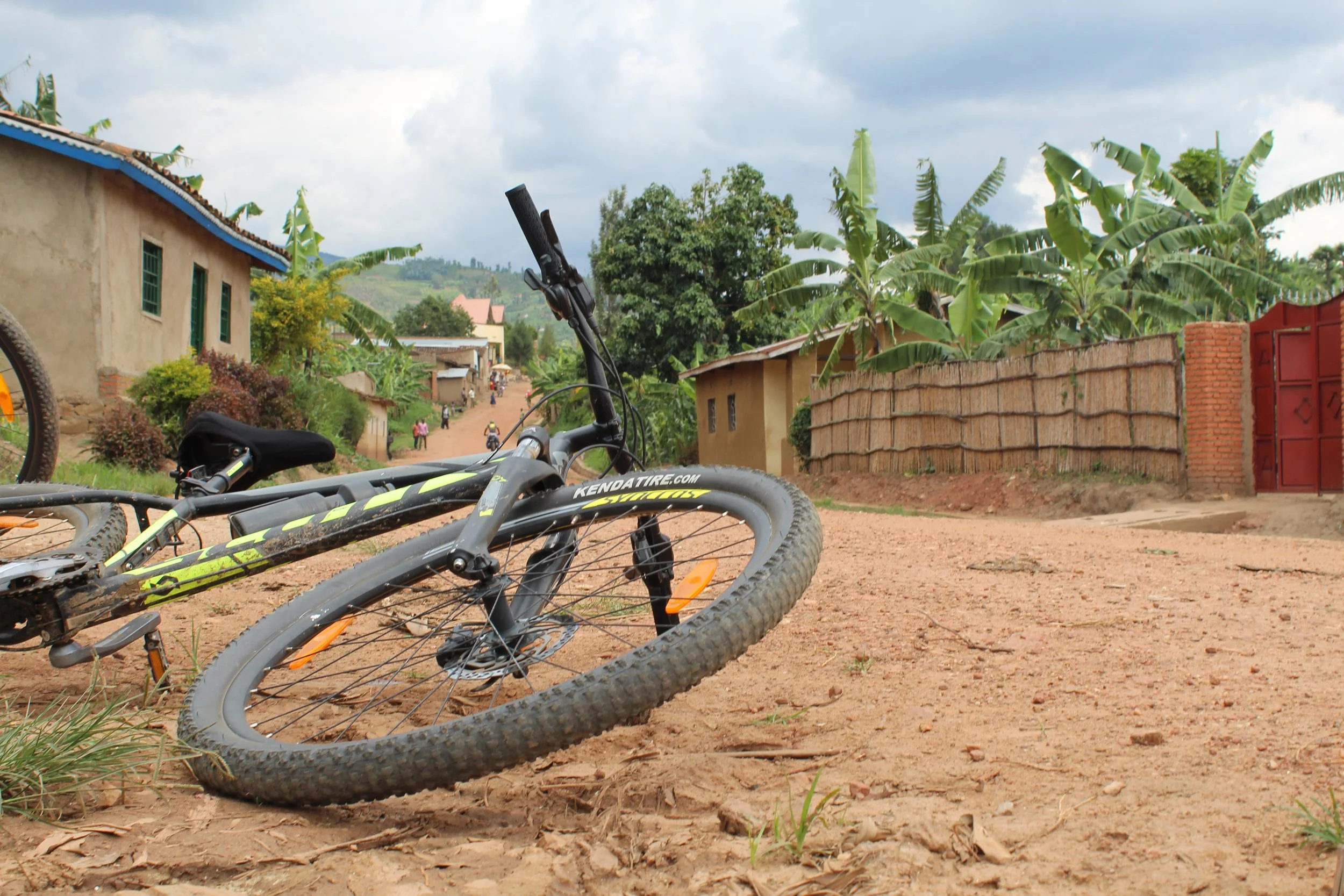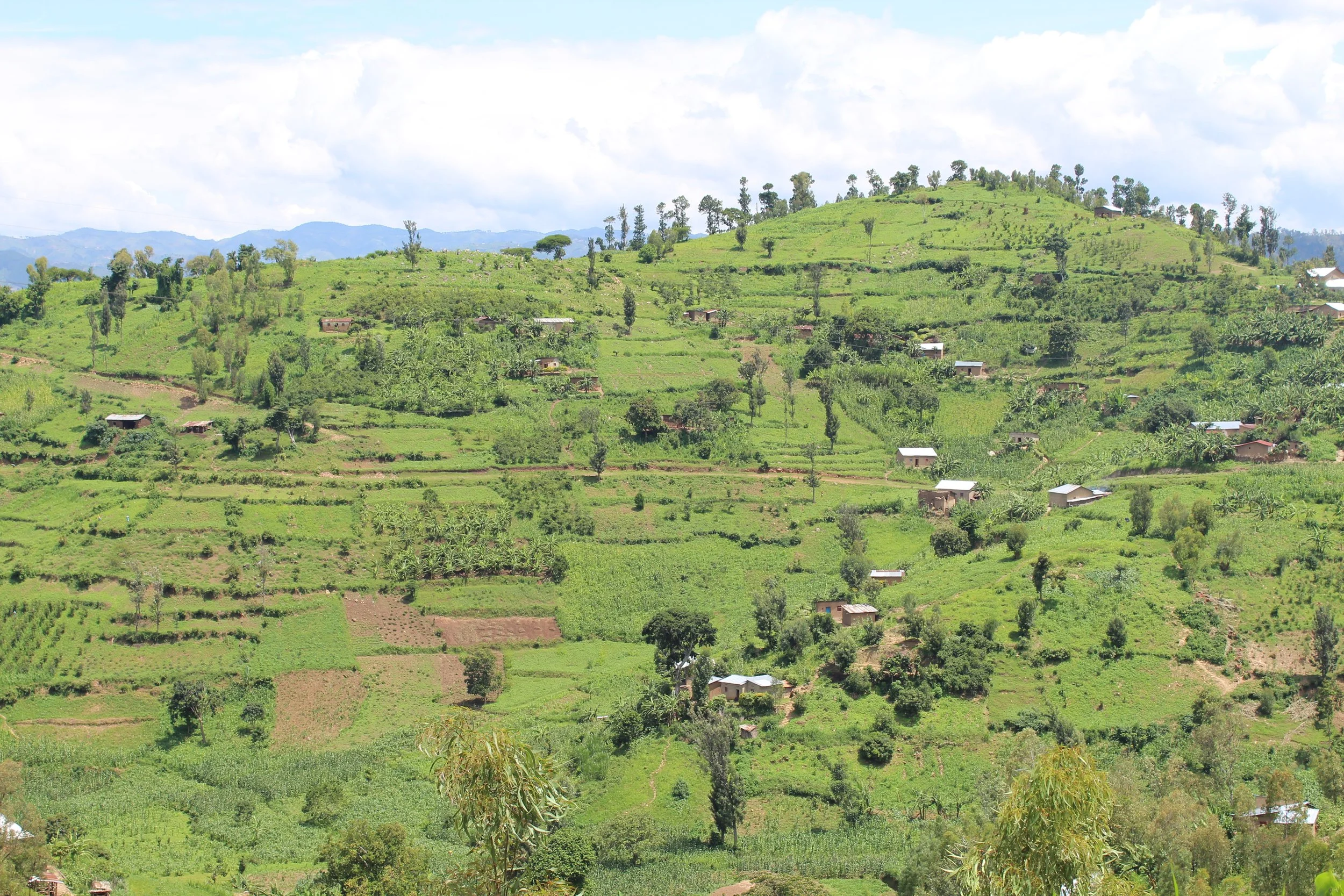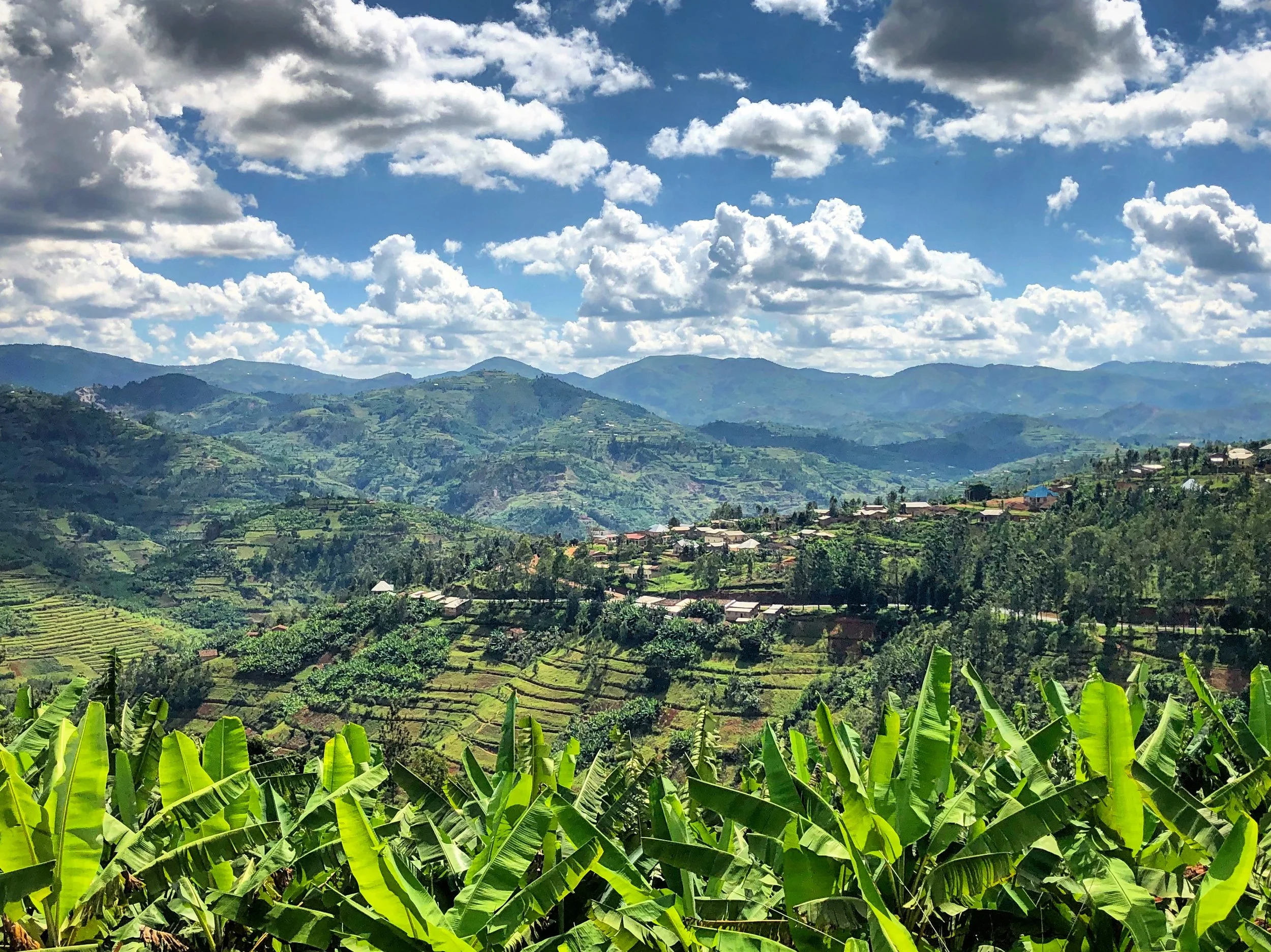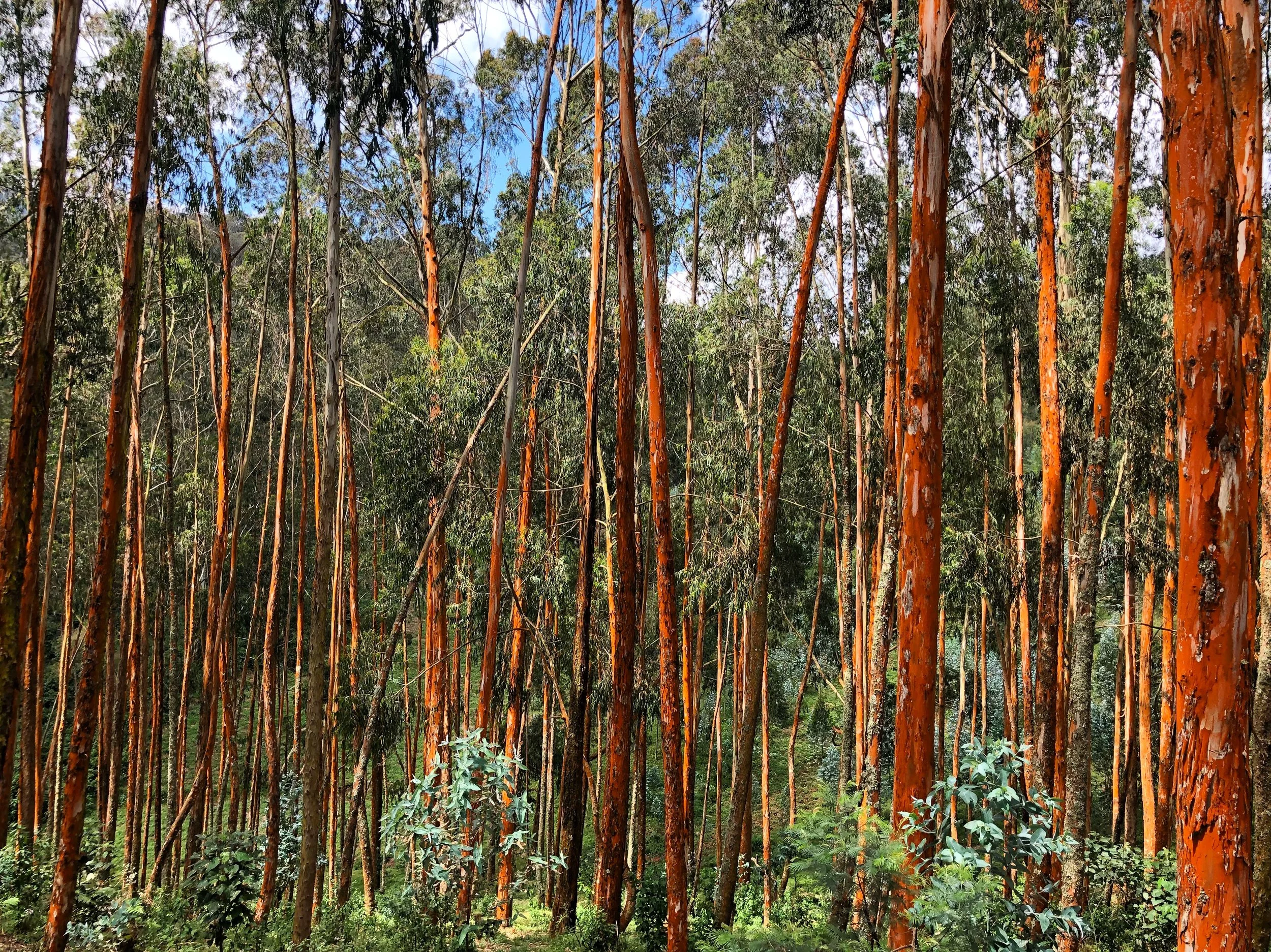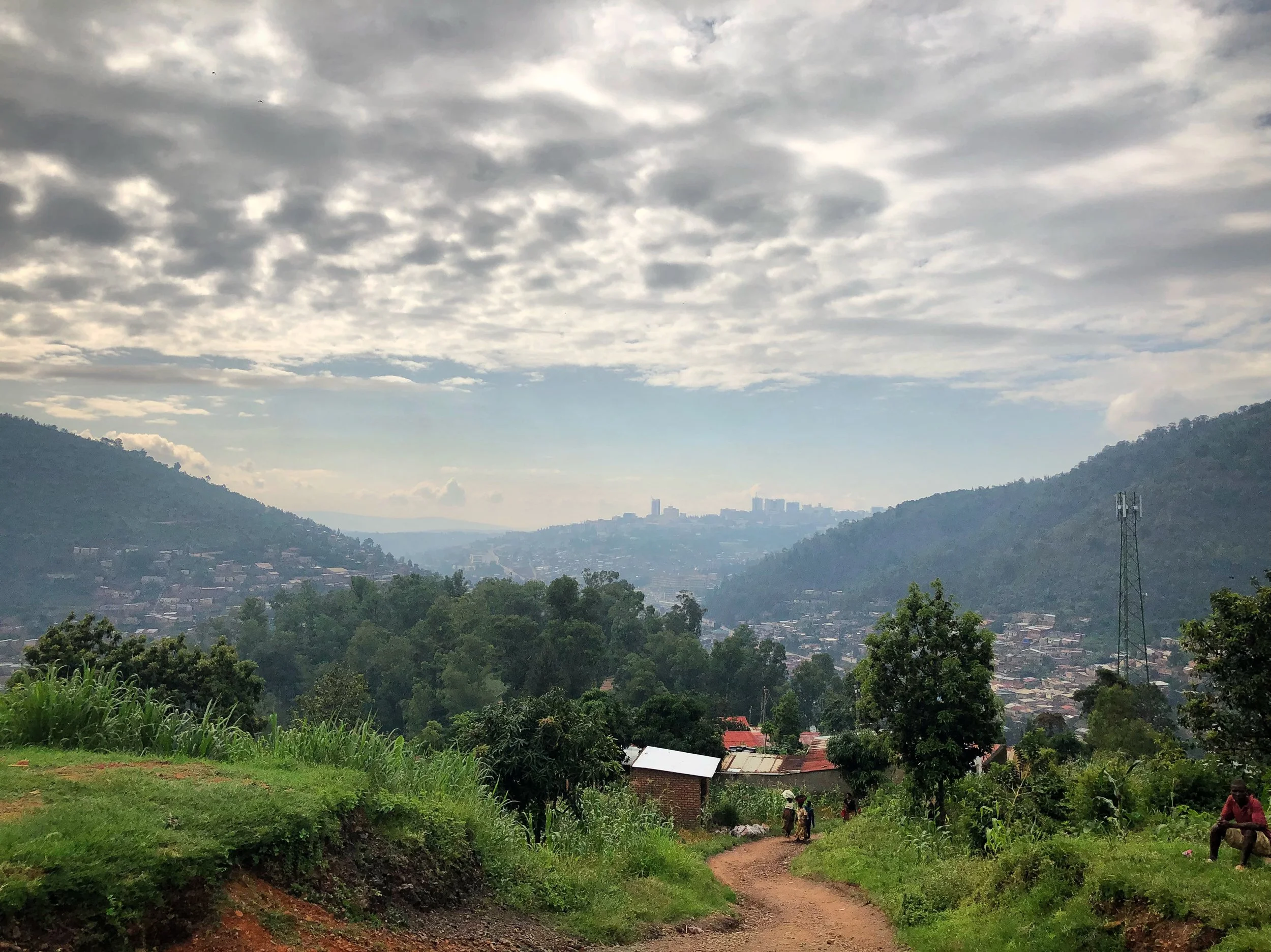About Rwanda
Published by Adventure Medic:
https://www.theadventuremedic.com/adventures/rwanda-tales-from-the-congo-nile-trail/
"The pillow is not for sale. You have to give it back!"
It was 6.30am and we hadn't slept. A 12-hour drive from Kampala to western Rwanda beckoned. I'd attempted to abduct a pillow before checking out of our hotel. The eagle-eyed receptionist foiled my plot. Reluctantly, I passed it through the van door and rested my head against the window.
I lived in East Africa for three months. The London School of Hygiene & Tropical Medicine’s DTM&H had been immersive to the end. The tense focus of revision, the strain of examinations, the release and celebration in the aftermath, the bittersweetness of graduation and parting. We stood on the lawn of Mulago hospital for the class photograph. Everyone wore something made of Kitengi, stitched from cuts of the same cloth. Then 72 people who had lived at elbow and foot with one another for 88 days disbanded to their far corners of the world.
Before returning home, Steven Leask, Tansy Wilkinson and I made for the Congo Nile Trail - a 257km trail with 5800m climbing through the hills of western Rwanda. Steve found a driver who would take us across the border to Gisenyi, Tansy found a company to hire bikes from and I dropped my luggage with Hervé, a Congolese neurosurgeon in Mulago hospital. Logistical matters resolved, we fell asleep as Hussein's old Toyota rumbled into Kampala's morning traffic jam.
*
I awoke lying on my back. Didn't know where I was. Terraces were cut into steep hillsides around me where thick forest had been hewn back. We turned fat bends in the road which wound through the mountains like a snake.
On the Rwandan border a WHO checkpoint screened us for fever. An Ebola outbreak in northeastern Congo was making neighbouring Uganda, Rwanda and Burundi nervous. For good reason. Viral haemorrhagic fever outbreaks are terrifyingly difficult to manage in any setting. Ebola in one of the world's most fragile, conflict-ridden states presents an even more apocalyptic nightmare.
Mercifully afebrile, we drove across the border into the land of a thousand hills.
The Congo Nile Trail begins on the border of the DRC at Gisenyi. Like Kigali, the capital city which feel like an African Geneva, the town is quiet, sterile and orderly. Rwanda lacks the humming, riotous life of its neighbours but is spotlessly clean. First and last Saturday of each month is 'general cleaning’: everyone goes out into the street to sweep and pick up rubbish. Christian, a Rwandan friend working for Partners in Health in Kigali, says people generally don't mind: "You get to know your neighbours, it builds the social fabric."
Collective cleaning also changes behaviour, according to the owner of a guest house we stayed in one night:
"You feel ashamed if you clean one day and the next you are dropping your rubbish.”
Though it is clean, Rwanda is no paradise. Progressive yet repressive, the Rwandan state stifles opposition and foments disintegration in neighbouring DRC to extract mineral resources. Rwanda exports coltan, raw material for the smartphone in your pocket. Much of it smuggled from conflict areas across the Congolese border.
Paul Kagame, commander of the Rwandan Patriotic Front which ended the genocide after the UN pulled out and the world fumbled, has proved skilful in mobilising the guilt of the international community to aid the rebuilding of Rwanda. Gaunt, bespectacled, a voracious reader. Autocrat of twenty-some years. He has a sister who sells milk in a small shop in Kigali.
The government recently paid £30 million to have 'Visit Rwanda' emblazoned on the sleeve of the Arsenal jersey. This provoked controversy: a country receiving £60 million in UK aid annually deciding to shell £30 million on a Premier League sponsorship deal. On Radio 4’s Today program, Clare Akamanzi of the Rwanda Development Board bit back: her country would invest its resources in whatever serves their interests. The deal would promote tourism. If it doesn’t work, they can try another strategy next season.
In a decade Rwanda reduced from 80% to 17% the proportion of its budget derived from foreign aid. Arsenal may prove a decent bet. Tourism already supports 132,000 jobs and accounts for 12.7% of GDP. There’s now a direct flight from Gatwick to Kigali.
But as Christian pointed out to me, the deal serves another purpose:
“Everyone thinks of Rwanda and they think of the genocide. Now you hear this tiny country is sponsoring Arsenal and it makes you think: what’s going on there? The point is to change the narrative.”
We went to the office of Rwandan Adventures. Joyce, allegedly the country's only female bike mechanic, maintains a collection of Scott hardtail mountain bikes. We picked one each and were introduced to our guide Twizi - who spoke neither English nor French. We shrugged, slurped a large glass of something with a taste and consistency like sour cream, winced in unison, and set off.
On the dirt road out of Gisenyi we passed an Amstel brewery (Belgian colonialism dies hard) and a sign for Gahondo St Michel school which promised 'Nobleness, Bravery & Skills’.
Growing accustomed to the rough trail and our new bikes we rode past Cyimbiri Waterfall and stopped for a lunch of beans, groundnut sauce, spinach and a fistful of small fish called isambaza. A couple of cyclists from Arizona, the only other travellers we met in five days, offered me some chilli oil called Akabanga which improved the fish but nearly ignited my face.
Robert H. Miller sported long socks, aviator glasses, a handlebar moustache, collared shirt and heavy cotton shorts. From beneath the brim of his hat he explained that he was a retired mountain guide, builder and author of the only guide to the Inside Passage: a kayaking route from Washington state to Alaska. He was cycling through Rwanda with his wife on a commission from Liberty Unbound, a libertarian magazine. Mr Miller and his wife were the only other travellers we met that week.
As the day wore on, my abiding sense became one of modest bafflement. In the road children shouted
"Good morning! Good morning!"
It was 4pm.
"Where are you going?"
"Kigali!"
This was true in part - we were heading to the capital at the end of the five day ride. But in a more proximate respect an honest answer would have been "I haven't a clue."
Twizi had been a rider for Team Rwanda and was by any measure a strong cyclist. But as a guide he was completely ineffectual. Questions received one of three answers: "yes", “no”, or "four minutes" - these meted out at random. We never understood where we were going or what we might find when we got there. We did not have a map. So we ploughed on and learned slowly to accept the mystery and the trail as it came to us out of the trees.
The equatorial sun beat down unflinchingly and by mid-afternoon I was burning. I had an Orkney wool blanket to fend off cold mountain nights but the prospect of shrouding myself under metres of tweed did not appeal. I wondered if I could purchase of a shawl from someone’s washing line. It was a buyer’s market: as negotiations proceeded, women kept appearing from their houses with a variety of other shawls trying to sell me a whole set. Eventually I settled on a purple one.
In the garden beneath the Kinunu Guest House coffee grows with bananas, avocados, mangos, lemons, oranges, pineapples, papaya, apples and guava. I counted four cows and twenty chickens.
Walking among the fruit trees we met Chrysologue Karangwa, former Rwandan senator and onetime university professor in Kinshasa and Burundi. At 78-years old he'd retired from political life to look after his land. He showed us his coffee washing station. January to June, hundreds are employed in the harvest. The fruit, milk and chicken in the guest house come from the garden.
In the morning we took coffee from the plantation, thick like treacle. Across the lake we could hear shouts and songs of fishermen returning from the night. Twizi briefed us on the route for the day:
"Up, up, up, down, up."
As villages became more dispersed the route narrowed blessedly to single-track. We forded small streams with the assistance of little children and crashed through low thick grass.
Descending a particularly rocky section my bottle sprang from its cage, crashed to the ground, and cracked open. A patchy combination of French, Swahili and gesticulation procured me three bottles of Fanta and a ripe pineapple later that morning.
We climbed high above the lake into twisting hills. The air thinned and cooled. Children called to us in laughing voices.
“Umuzungu! Umuzungu!” (white person in Kinyarwanda)
Beaming, I rode lightly through the hills and overshot the lunch destination. Steve dispatched a motorcyclist down the valley to chaperone me back to the hilltop village.
Accommodation throughout was clean but basic. That night we slept in rooms belonging to a Ugandan expatriate called Ernest. Thin, garrulous, and energetic: Ernest was a man on transmit. I sat quietly in the night and enjoyed the sting of the whisky on my sunburnt lips. Beside a fire, Orkney blanket draped over my shoulders, I listened to Ernest talk of Rwandan history, the politics of the region, and why he came to live alone on the hill of Bumba village.
"Because they knew they were coming from hell to life, they needed a plan for what to do. So they make it clean, they make it safe, they hope when you think of Rwanda you will come”
He was talking about the genocide, of course. 1994. One hundred days. 800,000 Tutsis and moderate Hutus, probably more. Murdered by machete, spear, blunt tools, grenades, kerosine, rivers. Hard to believe these hills could have run with so much blood.
By most markers, Rwanda is climbing out of hell. Ranked among the least corrupt countries on earth, with more female parliamentarians than any other nation, universal health coverage and a predictable, market-friendly government. Thousands have been lifted out of poverty. Life expectancy increased from 48 to 67 in little over a decade.
The following morning I briefly exchanged bicycles with a courier riding a single-speed Eastman bike up the pass to Muramba. I instantly lost control - overcome by the high gear I narrowly avoided the ditch. It was a bone rattler: bent cranks, wobbly bottom bracket, one working pedal on the left and just an iron bar to press against on the right. It makes you wonder at the strength of the men and women who ride these contraptions through the hills day after day.
We took a paved road though the mountains as a cold wind blew. The roads are beautiful, with sweeping bends and smooth tarmac. You climb and descend, climb and descend in view of hills, tea plantations and Lake Kivu far off. But by midday we were hungry though and Steve had lost patience with Twizi:
"I don't know what the fuck’s going on!”
With the assistance of Roger, the Arizonan couple’s English-speaking Rwandese guide, we learned that Twizi was nine years old in 1994 and had received only three years of primary education when his schooling and childhood were ended by the genocide. He fled to Zaire and lived as a refugee with his mother. He made deliveries on his bicycle as a teenager and started winning weekend races. He qualified for Team Rwanda and rode with them for three years but received no language instruction. He had worked for Rwandan Adventures now for five years, who in turn have not provided him with access to English classes. So he rides almost mute - unable to communicate with those he travels with week after week, unable to share stories, explain his native land, or function as a guide.
We were sitting outside a yellow-painted bar having difficulty acquiring lunch. The option seemed to be chips or brochette. But, in our ignorance, we did not know what brochette was. We phoned Roger:
“What is brochette?"
"It depends."
"Depends on what?"
"Maybe it's beef, maybe it's goat. It is brochette."
On this occasion, brochette proved to be liver - tough, chewy, origin unspecified.
We spent that night in a room attached to a boarding school. After a bucket shower I chucked a small rugby ball around the room with Tansy and waited for the large plumes of smoke and squabbling outside to turn into something resembling dinner. A young man with a large head and a Linkin Park T-shirt walked in and asked if he could take a pair of underwear. His name was Patrice and he was a teacher in the school. He was Brazilian-German, 20-years old, teaching computing for a year before going to university. He’d returned from Kigali after a second failed attempt to renew his visa. It became clear that we had commandeered his bedroom. Patrice was having a bad day.
Another day passed riding under the sun. Under a thatch bar beside the water at Ishara we met three Peace Corp volunteers. They'd come to Rwanda after college in the U.S. to teach in rural schools and had lived here for two years. They had mixed views of Rwandan education.
In 2009, Kagame decreed the language of instruction would switch from French to English. Teachers, many of whom could not speak English, were given a month to learn and then teach their classes in a different language. This has not worked well. Lucy explained:
"I walk past classrooms and hear teachers speaking a mixture of French and Kinyarwanda. When they see me, suddenly they shout 'now settle down class!' It's about the only English they know."
At the end of primary school, pupils sit an exam which determines the secondary school they will be eligible to attend. The exam is in English.
"They're being set up for failure.”
Rwanda is moving fast. Deciding to teach children English, the behemoth global language of science and business, is not necessarily a bad policy. But even good policies can be destructive if implemented poorly. Perhaps the transition will be made eventually and Kagame's view of an anglophone, technologically-enabled knowledge economy will be realised. But the number of children who will fall needlessly between the cracks from this day to that is beyond my ability to guess.
The last three days of the route from Gisenyi south to the bottom of Lake Kivu are covered on tarred roads. We breathed air heavy with tea plantations and mulled the complexities of the land we rode through. Where would Twizi see fit to deposit us next?
Mid-morning on the fifth day we pulled up outside a petrol station and were informed that the journey was over. There was little jubilation.
"Where are we now? Oh, is this it?"
True to the spirit of the trip, the name of the town we finished in was different to the one we thought we were heading for. Muttering resignedly, I shook Twizi’s hand and clambered on the bus to Kigali.
The road to the capital was similar to the route we’d cycled. The whole country spikes erratically into the sky as if the land were paper scrunched into a ball and then haphazardly spread out again. Occasionally we drove over unpaved sections and thick silver dust mingled with our bags and hair. The bus filled as we trundled through - stopping once to pick up sticks of maize grilled over a fire. Darkness came and I could no longer read. The girl beside me was sick on my leg. I opened the window to let away the smell. Our bodies were all sunscreen, bike oil, dust, forest. When I shaved that night, the dirt came off in streams.
We had drawn a line through Rwanda. With all the swiftness and superficiality that entails. I am not a traveller who lays claim to places. I haven’t done Rwanda. Haven’t scored it out on a map. That’s all you do as a visitor: draw your line; draw your conclusions. Yet the words store up and they have to come out.
We had moved safely, quickly and in relative comfort through this green land which within my own short lifetime has known a season of blood. Our journey was no great burden. It was a cycling holiday: with all the laughter and small glory they always contain.
For Ryszard Kapuściński, Africa did not exist. The continent was a “veritable ocean…an immensely rich cosmos” too vast to describe. All one could do was to write of “some people from there - encounters with them, and time spent together.”
As this region slowly steeps into my bones, I draw gradually toward that conclusion myself. Shaped by the same historical forces, plagued by ills of similar kin, imagined for centuries in bland generalities - yet these places are not the same.
Life in Rwanda goes on. As it does everywhere under the sun.
Wandering, faltering, but not lost.
